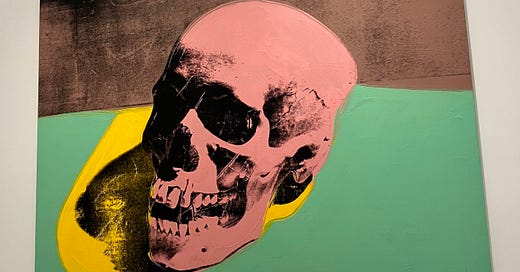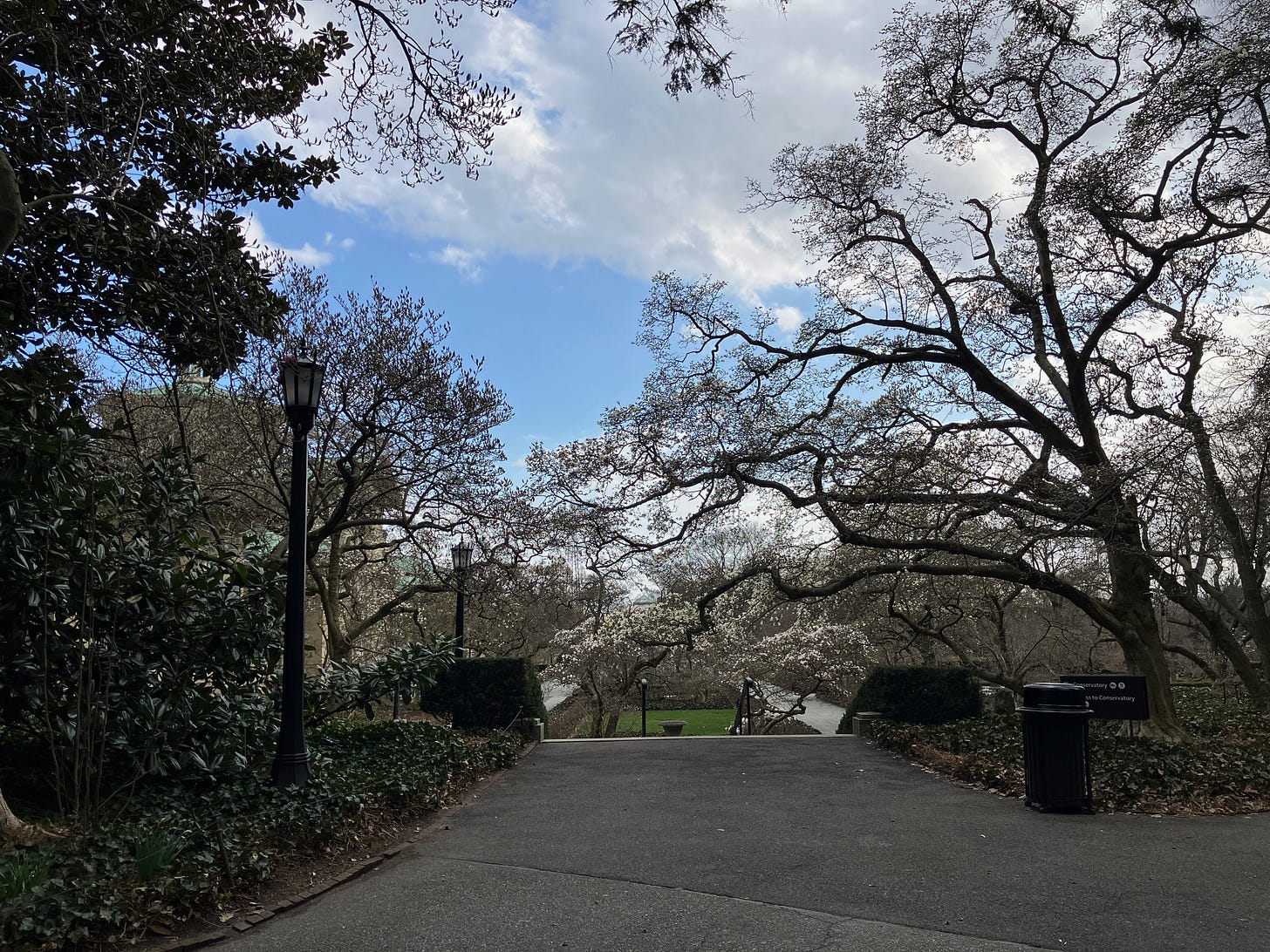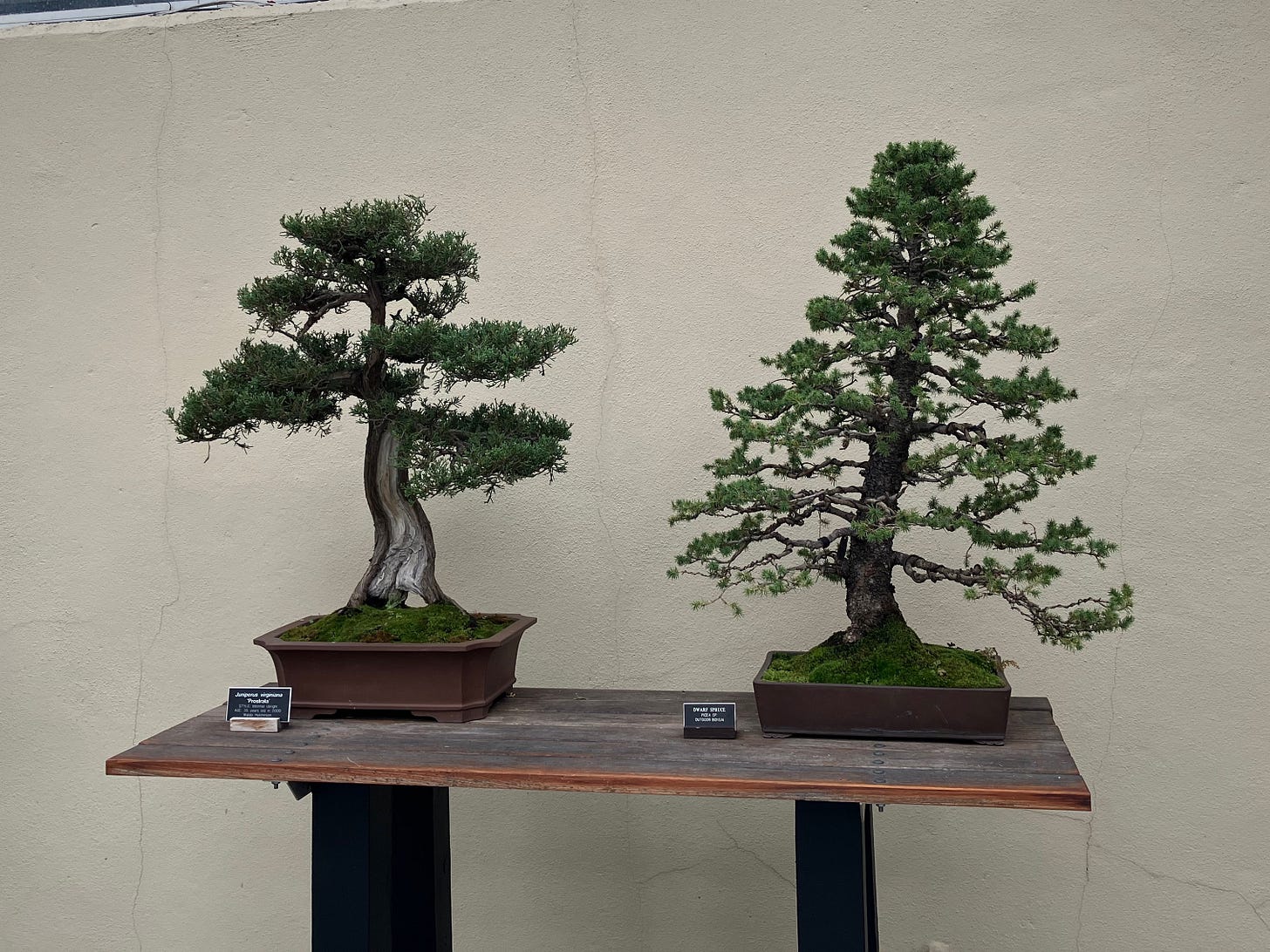The attention economy
On retraining my brain & regaining focus (plus, some "The Pitt" & "The White Lotus" finale thoughts)
I'm considering this a loose sequel to this piece on ambition. Maybe I’ll call this a series of periodic, culture-related essays about what unemployment has made me learn (or unlearn) about myself. Let me know if you like it, or if it feels too unfocused. (Or if you’re like: “More of your usual TV criticism, please.” On that note, stay to the end for some brief thoughts on the season finales of “The Pitt” and “The White Lotus.”)
In one of the galleries at the Andy Warhol Museum in Pittsburgh, there's a video of Warhol working on a painting. It plays on a TV screen adjacent to the painting in question, one of a series of hammer and sickle prints he made in 1976. In the video, Warhol pours paint onto a thin canvas laid out on the floor, then methodically spreads the paint around and around, using a sponge mop. Paint, mop, paint, mop — rinse and repeat.
During a visit there in early March, I must have stood in front of that screen for at least 10 minutes, staring intently, completely absorbed by his simple, routine movements, like I was a toddler gripped by a shiny new toy.
I think this is also part of the appeal of shows like "The Great British Bake Off" (and the related genre of feel-good craft competition programming). Yes, it's the sunny aesthetics and earnest competitors. But it's also the soothing repetition of watching them painstakingly put together their creations: one careful dusting of icing sugar here, one handmade fondant flower there. Maybe there's something about watching someone at work, performing the same motion over and over again, completely focused on the task at hand.
In 2025, writing about how much social media has broken our brains and shortened our attention spans is trite. But being unemployed has made me interrogate what is competing for my attention at any given moment, and maybe (maybe!) attempt to retrain myself to focus on one task at a time.
My brain often feels like it has too many browser tabs open, clicking from task to task, half-doing two of them at a time (which almost never works, yet I do it anyway). It reached its nadir between five and seven years ago, when several consecutive years of working in breaking news had done a number on my brain. It required me to almost always be in a reactive position, and to ingest what seemed like a superhuman amount of information (and I'd be extremely unkind to myself when I didn't feel like I knew enough, which was often).
I could feel myself unclenching a bit once I started writing about culture, which gave me much more autonomy over what I needed to respond or react to. More recently, abandoning the site formerly known as Twitter has also been helpful. I'm on the Twitter alternative Bluesky, but these days, because I no longer have a daily journalism job, I post far less and mostly log on to (sigh) promote this newsletter. Instagram is more of a battle, an on-again, off-again relationship. With every new social media platform, I wrestle with whether to join and stay up to date as a culture reporter, or to protect my brain. Increasingly, I err on the side of the latter.
I know my brain wasn't always wired like this. At 31, I'm young enough to have been immersed in the internet for much of my life — but old enough to remember when it didn't dominate everything, and to have grown up when it was all relatively nascent. (I see you, fellow millennials who started our "writing careers" on the various blogging sites of the 2000s.)
Sometimes, I get nostalgic for the time Facebook was for typing silly third-person status updates about school ("Marina Fang is studying for the APUSH exam") and dumping the entire contents of one's point-and-shoot digital camera, titling the album something mundane ("Last day of junior year"), and asking everyone to tag themselves. I chuckle when I stumble upon old email threads of my high school friends arranging when to see the new Harry Potter movie. While many of us were on some combination of these sites (we didn't yet call them "platforms"), it didn't feel mandatory or all-consuming.
It all seems so quaint now. Coming of age with these more prototypical forms of social media was a dividing line. A related and perhaps even more significant dividing line: smartphones. I didn't use one until college. The older I get, the more I realize I really dodged a bullet simply by being born when I was, therefore making me old enough to not have grown up with unlimited access to a pocket-sized carnival of overstimulation.
It makes sense why there has been a profusion of recent books and trend pieces about people wanting to live a more analog life, including ditching their smartphones. But societally, we're too far gone, too deep into "Brave New World" territory. And in many ways, even the idea of a more analog life is increasingly wrapped up in privilege: for instance, non-screen hobbies increasingly come with a hefty price tag. (Maybe that's why I have opted for watching other people doing these hobbies — on a screen.)
Like with many things in life, I'm aiming for moderation and balance. While unemployed, I’ve struggled with how to allocate my time and attention, juggling the job hunt, teaching, and everything I need to do — against what I actually want, which is rest, after a decade of surviving a turbulent industry. For now, I’ve been trying to be better about taking certain days, or portions of days, to do something for myself.
A couple weeks ago, I gave myself the afternoon off and walked around the Brooklyn Botanic Garden. I'll admit I didn't fully take a break from my screens: after a section of the garden, I would stop to check my phone and, say, answer a somewhat time-sensitive email from a student. After all, it was the middle of a regular week. I couldn't check out of my responsibilities. But I know I could have been more disciplined about it. My impulse to be instantly reactive and responsive is hard to unlearn.
The best I can do is to try to pay closer attention to when my brain seems clearer and quieter. I'm at the age when quite a few of my friends are new parents. There's something pure about watching my friends' infant children discover the world for the first time, being completely mesmerized by a beam of light or a picture in a book. To them, everything is brand new and full of delight. And for me, spending time with them forces me to be very present. (If you're reading this: thanks for being great friends, and for producing some A+ new humans.)
Sometimes, I wish I could erase my brain and start anew, "Eternal Sunshine"-style. Do a full system reboot, or trade it in for a newer model. Short of that, I turn to more analog sources of attention when I can: Calling a friend on the phone. Reading physical books. Taking a walk. Communing with nature. Seeing some art in person. Focusing on one word, or paint stroke, or movement at a time.
As promised, some brief TV thoughts (if you’re a newer subscriber, here’s what I’ve written previously about “The Pitt” and “The White Lotus”):
Continuing my tenure as the resident “White Lotus” dissenter, so much of what happened in that finale felt unearned to me. It was like Mike White was just throwing everything at the last half hour. Sure, there were some memeable moments. (“The coconut milk is off!!!” Relatedly, the jokes I saw people making about “Chekhov’s blender” made me cackle.) But as I have shaken my fist about many times, vibes do not make a show. Carrie Coon’s monologue could have been the season’s thesis statement — but there wasn’t much else to support it. Above all, a thesis statement is what the show has always lacked. Say something, not just: “What’s the deal with rich people?!” (said in a Jerry Seinfeld voice)
I have less to say about the season finale of "The Pitt," mostly because what a spectacular end to one of the best and most assured first seasons of television I’ve seen in a long time. The speed at which I went from thinking: Why are we doing another medical procedural in the year 2025? to: Give me Season 2, stat! The show’s deft understanding of restraint is such a gift. Of course, I’m thrilled it got renewed. But I also think those 15 episodes work so well on their own, almost like an anthology, and it’s one of those seasons of television I’ll come to re-appreciate on every rewatch (which I will definitely be doing between now and Season 2).
Thanks for reading and for being here. What is your relationship to attention when so many shiny objects are competing for it, including and especially our devices? Have you incorporated more analog sources of attention? Or any final “The White Lotus” or “The Pitt” thoughts? If you know me in real life, we can yap about it offline. Programming note: your newsletter correspondent is taking a much-needed vacation this week (obviously, I am not booking a stay at the White Lotus). Back in your inboxes two Sundays from now.







Thank you for this. It says here, first and foremost, protect your brain. We will all need you at full capacity on the path ahead. Second, yes please for “a series of periodic, culture-related essays about what unemployment has made me learn (or unlearn).” We are all in a turbulent, destabilizing time of radical change. And your perspective is essential to understanding where we are and finding our way through all of this. It’s certainly not your responsibility to help point the way. But we’d all be better off if you did. And I fervently hope that you will.
✌🏼❤️